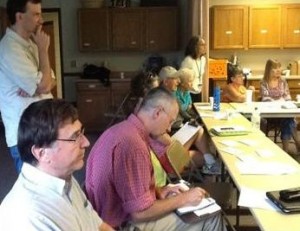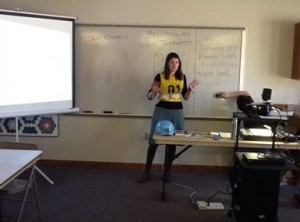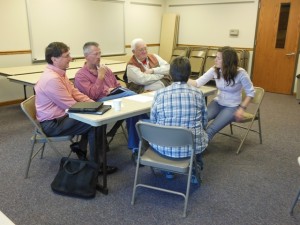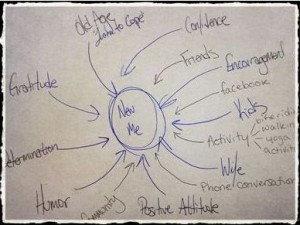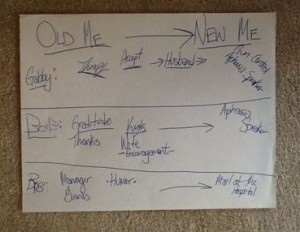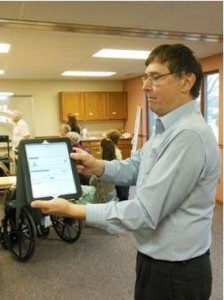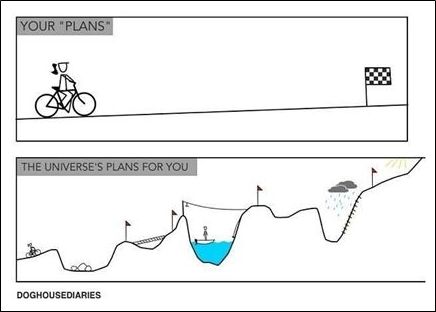6-2013: Part I
Stories from our life experiences can help us better understand ourselves and each other. Our Aphasia Group follows a tradition of listening, asking questions and thinking together when a member tells their story.
In May of 2013, Elizabeth, a volunteer with the Chippewa Valley Aphasia Group, shared her story with us. Elizabeth experienced a brain injury following a skiing accident. She discussed the different phases of recovery. She began by describing the disappointment of not being able to return to her “previous life.” We engaged in discussion about emotional recovery following injury. She shared about her family’s words of encouragement and the hard road of rehabilitation.
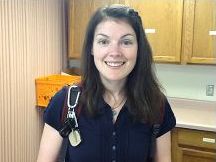
She talked about her reactions to her family’s and therapists’ advice and instruction. She discussed how her attitude toward recovery has changed with time. She said that her relationships with family and therapists fostered confidence and encouraged her to “keep improving.” She gradually found a new perspective. As she improved, Elizabeth began to “practice” independently in order to support her recovery. “One of the important lessons that I have learned along the way, is to pursue new interests in small steps”, she says.
Elizabeth expressed gratitude for the patience and creativity of her Speech Therapist. We asked Elizabeth about her “improvement” during and after rehabilitation. She said that being challenged to try new activities and persisting in practice was helpful. Elizabeth described her adventures in glassblowing, art, helmet safety speeches, weight lifting, and ceramics. Through trying new things, Elizabeth found new meaningful activities.
Elizabeth’s story was much appreciated by the Chippewa Valley Aphasia Group. Members expressed admiration for her courage and for sharing her story. Everyone could identify with her experiences. Our group members expressed interest in learning more about using a “small step” approach to make choices and practice.
6-2013: Part II
Following Elizabeth’s story, we explored how our members’ stories relate. In small groups, we shared discussion on experiences in therapy and emotional recovery. Members shared their successes and challenges during recovery, and the lessons they learned along the way. Groups reflected on people and experiences that have aided them in the development of a new identity while in the process of recovery.
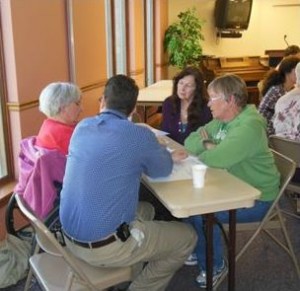
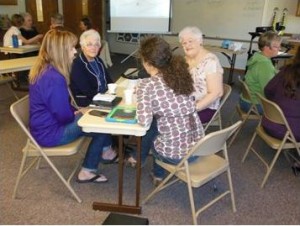
A member of the Dane County Aphasia Group, Naomi B., shared her poem, New Normal. Her poem compares her impatience to return to her normal activities following stroke with the change in perspective she has gained through rehabilitation. “My new normal teaches patience. I can: read and understand deeply, it just takes time; write a letter or beautiful poetry, it just takes practice.”
Group members related to the fact that recovery is a process with no end, and that we are always learning and growing. One member shared the following picture that may illustrate our feeling as we cope with and learn to compensate for our challenges.
We believe that Elizabeth’s story offers valuable lessons for many others. She has agreed to let the Chippewa Valley Aphasia Group record her story to share with other Aphasia Groups, families, and volunteers.
Watch this Website for further updates!

